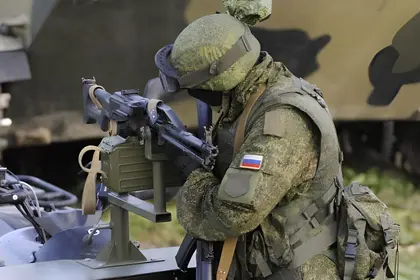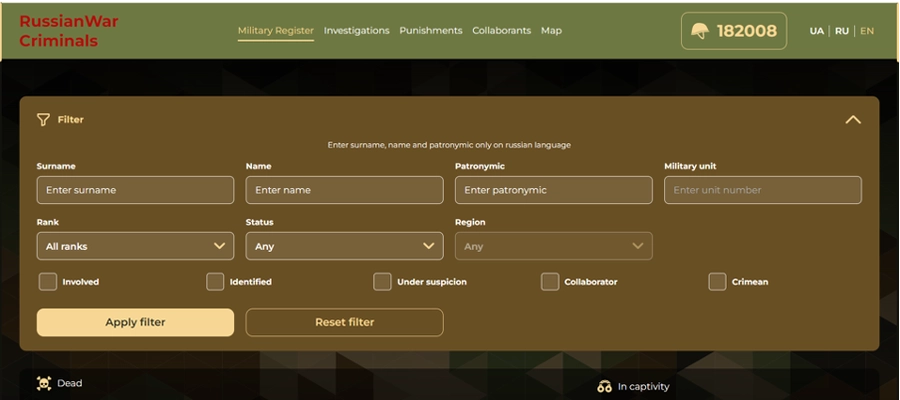Investigative journalists and the Anti-Corruption Headquarters have created an online register of war criminals to document incidents, which already includes over 180,000 Russians.
Journalists of the Ukrainian independent investigative agency Slidstvo.Info and activists of the Anti-Corruption Headquarters have already identified 182,000 Russian war criminals involved in the war against Ukraine. The Register of Russian War Criminals was created in March 2022 and information has been input since then.
JOIN US ON TELEGRAM
Follow our coverage of the war on the @Kyivpost_official.
Register of Russian War Criminals website (https://rwc.shtab.net/en/troopers)
Serhiy Mytkalyk, chairman of the board of the Anti-Corruption Headquarters and co-founder of the Register of Russian War Criminals, said that they use journalistic investigations, Russian telegram channels, and other resources to search for unidentified and/or unlocated Russian soldiers involved in the incidents.
“We also cooperate with investigative authorities, including the Prosecutor General’s Office. However, for objective reasons, the pace of investigation of these crimes is not as fast as [the public] expects. As of today, we have about 170 verdicts against Russians, including State Duma deputies,” Mytkalyk said during a press conference on Monday, Nov. 13.
The Prosecutor General’s Office reportedly explains the relatively slow pace of its investigation by the fact that Ukraine is the first country to investigate war crimes during active hostilities. Investigative authorities spent the first year and a half recording evidence and not losing it.

US Must Address Russian Disinformation to Strengthen US Election Integrity
“We have 109,538 proceedings under the article ‘violation of the laws and customs of war.’ There are 450 suspects in these crimes, indictments have been drawn up against 291 people, and guilty verdicts have been handed down against 66 people,” Oleksandr Zyuz, head of the Department for Intergovernmental, State and Non-Governmental Organizations of the War Department of the Prosecutor General’s Office, said at a press conference.
However, Mytkalyk remains optimistic about the dynamics of the investigations and notes that “the best punishment today is carried out by the Armed Forces of Ukraine (AFU). And more than 300 thousand killed Russian soldiers, I think, is the best punishment for the occupiers.”
He said the ultimate goal is to prove the crimes and bring to justice not only every Russian soldier involved in the war against Ukraine but also the Russian leadership, including Russian President Vladimir Putin.
Oleksandr Voloshyn, a representative of the Slidstvo.Inform agency, said there is a lack of proper training for prosecutors and police officers in Ukraine on how to record war crimes. He said such training for law enforcement should have started earlier and this could affect the pace of prosecutions.
It’s becoming more difficult to identify criminals, even with the help of world-class researchers. Also, public interest in war crimes, especially those related to collaborationist activities, has declined.
“The development and success of the registry depends on the constant participation and vigilance of citizens in tracking and sharing information about war criminals and collaborators,” Voloshyn said.
Representatives of many international institutions, including the OSCE, left Ukraine immediately after the start of Russia’s full-scale invasion or a few days before, leaving only law enforcement and Ukrainian human rights organizations to document war crimes.
Victims or witnesses of Russian war crimes can report incidents and provide evidence to the Office of Prosecutor General at https://warcrimes.gov.ua/, available in both Ukrainian and English.
You can also highlight the text and press Ctrl + Enter







